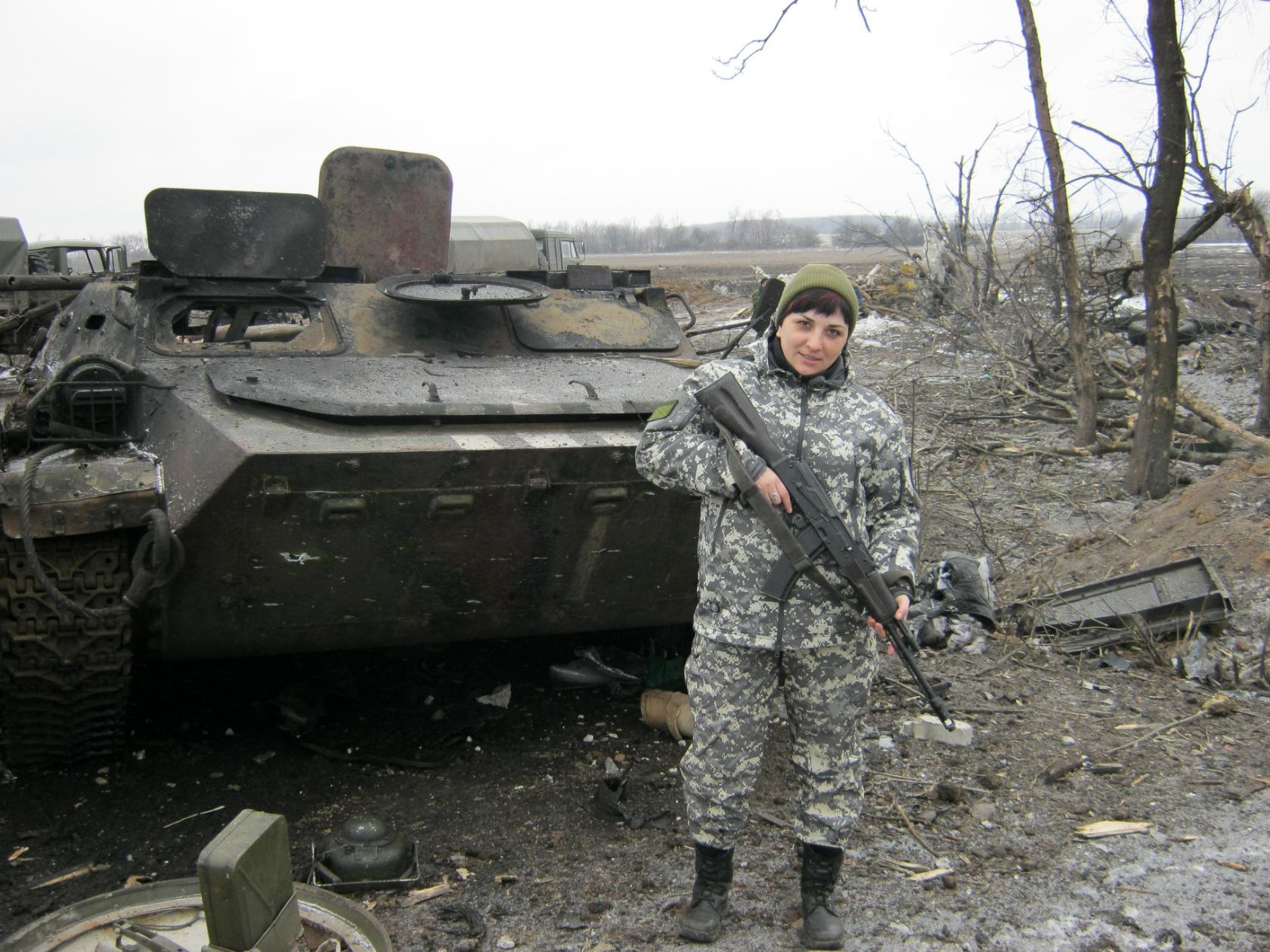Her story reads like a run-of-the-mill spy thriller plot, with all ingredients included — hatred, passion, war, strong characters, betrayal, and even love.
It is as hard to believe as pulp fiction as well, but now it has been officially confirmed: Svitlana Driuk, a notorious female warlord fighting against Ukraine with Russian-led forces and celebrity of Russian war propaganda, defected to the Ukrainian side a while ago, aided by Ukrainian intelligence.
Moreover, as her defection was revealed in media, the notorious former militant commander gave some details about Russia’s direct military involvement in the occupied Donbas and even said she was ready to be a witness at trials in The Hague.
A video report by famous journalist Andriy Tsaplienko aired late on March 3 on 1+1 TV channel told the life story of Driuk, who joined Russian-led forces in the early stages of Russia’s intervention in the Donbas. She started as a combat sanitary assistant, but quickly moved up the ranks to become an armored force commander.
According to the database of the Myrotvorets Center, she was born in 1978 in Donetsk.
Going under nom-de-guerre “Veterok” (“breeze”) she became famous for leading a unique all-female crew of a T-64BV main battle tank, aggressively promoted in war propaganda in Russia and the occupied Donbas.
The pinnacle of her career came when she was made the chief executive officer of the Vostok regiment led by Oleksandr Khodakoskiy, a notorious warlord and the former head of the SBU security service’s Alpha special task team in the city of Donetsk.
In her interview with journalist Tsaplienko, she admitted killing Ukrainian soldiers.
“I’m not justifying myself,” she said. “It was just a specific time, and I was doing what I was told to.”
The image of Druik as “a people’s hero” was so extensively exploited by Kremlin-controlled media that it gave birth to the first full-length fiction movie “Opolchenochka” (“The Little Militiawoman”) telling the Kremlin-driven propagandist narrative of an all-female tank crew bravely fighting the “evil” Ukrainian army invading the Donbas.
Directed by Russian national Aleksey Kozlov, the movie was filmed in 2018 in occupied Luhansk Oblast with a mix of local and Russian cast. The movie was scheduled to debut on screens in Russia on May 9, 2019, on the day Russia celebrates the allied victory over Nazi Germany in 1945, another theme of the Kremlin’s ever-intensifying militaristic propaganda.
But showing a movie character based on Druik on the silver screen could now be a problem — as it appears that in the last months of her service Driuk made contact with Ukrainian agents and leaked important intelligence.
According to her, the real control over the Vostok Regiment is held by a Russian regular military officer named Aleksey Berngard. Besides, she told, the Russian leadership in the occupied Donbas had developed a mechanism for deploying new combat units at the bases of already-existing local formations.
Each and every Russian-led local formation had a prepared database of cover identification documents so that Russian military servicemen deployed to the war zone could be falsely identified as mobilized local collaborators.
“All the Russians in the list are documented as locals,” Driuk said. “(During an all-out invasion), each regiment and any other unit is to expand into three new ones. If a regiment has 2,000 troops, then 6,000 (Russians) will join.”
The Russian command under this plan could quickly deploy up to 100,000 troops to the Donbas, which would be able to start crossing the Ukrainian border within four hours, the former warlord said.
She also leaked to Ukraine intelligence some documents on secret tests of the latest version of Russia’s T-72 main battle tank, the T-72B3, in the occupied Donbas.
According to Driuk , the live fire tests of the tank were coordinated by Yuriy Prilutskiy, a regular Russian army serviceman with the rank of captain. According to Tsaplienko’s report, in the fall of 2018, eight Russian tanks from the Vostok regiment had been blown up by a Ukrainian special forces team, and several days after, Driuk fled from occupied Donbas.
Her defection to Ukraine was kept secret until just recently, when, according to Tsaplienko, Driuk’s two children were smuggled from the occupied city of Donetsk to Ukrainian-controlled territory.
Interestingly, as the story says, her decision to flee the Russian-led forces’ ranks was prompted by love for a Ukrainian intelligence officer.
“I hopefully have a friend here who is now much closer to me,” she said. “Yes, he’s a secret service agent. And the attitude of the guys who have a role to play in my fate now is very different from what I saw (among the militants). I don’t have any regrets.”

A screenshot from video plot on 1+1 channel showing Svitlana Driuk, the former female militant warlord defected to Ukraine in late 2018.
Moreover, she said in the interview that she was ready to go back to war front in case of major escalation — only in Ukrainian uniform.
The story predictably triggered a tidal wave of skepticism in Ukrainian social media.
But later on March 4, the SBU security service officially confirmed Driuk’s defection to Ukraine.
“The defection became the final stage of a long-lasting operation of the SBU’s counterintelligence department, as result of which a valuable witness was won,” the agency’s press service said.
“Along with important materials on the leading role of officers of Russia’s Armed Forces and intelligence agents in organizing terror activities in the Donbas, the SBU gained additional intelligence regarding the structure and staffing of the (Russian-led) forces, and depots of fuel, munition, and heavy weaponry constantly brought from Russia.”
“This operation was a battle of intelligence and professional skills between the Russian and Ukrainian secret services, and the result is more evidence of Russia’s armed aggression,” the SBU quoted its head, Vasyl Hrytsak, as saying.


